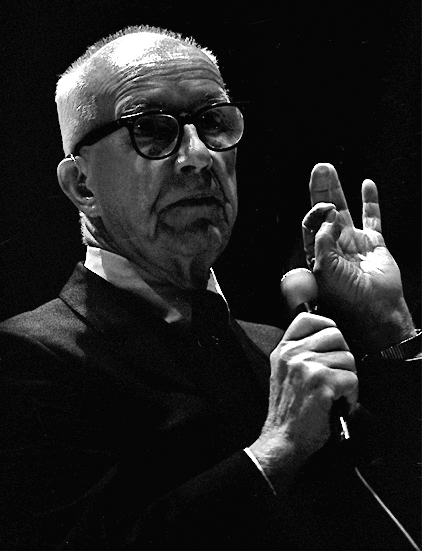Ричард Бакминстер Фуллер знаменитые цитаты
Ричард Бакминстер Фуллер: Цитаты на английском языке
“The opposite of nature is impossible.”
Public lecture at Columbia University (Spring 1965), quoted in "Buckminster Fuller: Thinking Out Loud" at PBS (12 December 2001) http://www.pbs.org/wnet/americanmasters/r-buckminster-fuller-about-r-buckminster-fuller/599/
1960s
1970s, Synergetics: Explorations in the Geometry of Thinking (1975), The Wellspring of Reality
In Buckminster Fuller and Answar Dil, Humans in Universe (1983), 218.
From 1980s onwards
“I find people only listen to you when they ask you to talk to them.”
From 1980s onwards, Only Integrity is Going to Count (1983)
1970s, Synergetics: Explorations in the Geometry of Thinking (1975), The Wellspring of Reality
1960s, Operating Manual for Spaceship Earth (1963)
Источник: 1960s, Presentation to U.S. Congressional Sub-Committee on World Game (1969), p. 15
1970s, Synergetics: Explorations in the Geometry of Thinking (1975), The Wellspring of Reality
From 1980s onwards, Cosmography (1992)
From 1980s onwards, Grunch of Giants (1983)
501.13 http://www.rwgrayprojects.com/synergetics/s05/p0000.html#501.10
1970s, Synergetics: Explorations in the Geometry of Thinking (1975), "Synergy" onwards
1005.52 http://www.rwgrayprojects.com/synergetics/s10/p0520.html#1005.50
1970s, Synergetics: Explorations in the Geometry of Thinking (1975), "Synergy" onwards
1947
Earth, Inc. (1973) ISBN 0-385-01825-8 This is just part of a very long sentence that covers the whole first page, but in this part of the quote, the intention of the entire book is stated.
1970s
From 1980s onwards, Critical Path (1981)
Pattern Integrity 505.201 http://www.rwgrayprojects.com/synergetics/s05/p0400.html#505
1970s, Synergetics: Explorations in the Geometry of Thinking (1975), "Synergy" onwards
"Less is more" is often misattributed to Fuller or to Ludwig Mies van der Rohe and it has become a prominent motto for minimalist philosophies. It was actually used much earlier in Robert Browning's "Andrea del Sarto" (1855), and the similar German phrase "minder ist oft mehr" by Christoph Martin Wieland in Der Teutsche Merkur (1774). The expression "...doing more with less" is part of Fuller's definition of Ephemeralization https://en.wikipedia.org/wiki/Ephemeralization.
Misattributed
Prime Design (May 1960), later published in The Buckminster Fuller Reader (1970) edited by James Meller
1960s
From 1980s onwards, Critical Path (1981)
1005.54 http://www.rwgrayprojects.com/synergetics/s10/p0520.html#1005.50
1970s, Synergetics: Explorations in the Geometry of Thinking (1975), "Synergy" onwards
1960s, Operating Manual for Spaceship Earth (1963)
1960s, Operating Manual for Spaceship Earth (1963)
From 1980s onwards, Grunch of Giants (1983)
From 1980s onwards, Norie Huddle interview (1981)
Контексте: Neither the great political or financial powers of the world nor the population in general realize that the engineering-chemical-electronic revolution now makes it possible to produce many more technical devices with ever less material. We can now take care of everybody at a higher standard of living than anybody has ever known. It does not have to be “you or me,” so selfishness is unnecessary and war is obsolete. This has never been done before. Only twelve years ago technology reached the point where this could be done. Since then it has made it ever so much easier to do.
“The nearest each of us can come to God is by loving the truth.”
From 1980s onwards, Critical Path (1981)
1960s, Operating Manual for Spaceship Earth (1963)
1960s, Operating Manual for Spaceship Earth (1963)
